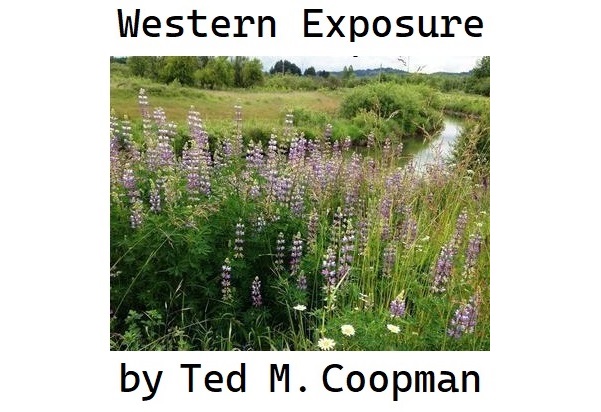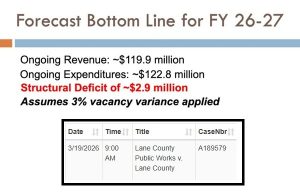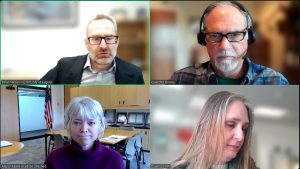Neighborhood associations are the foundation of Eugene’s democracy
8 min read
by Ted M. Coopman
The first neighborhood association in Eugene was founded 50 years ago. Until recently, neighborhood associations worked cooperatively with the city to help craft public policy and direct outreach, particularly on land use issues within neighborhoods.
However, over the last decade or so, there has been a concerted effort by some within city government, encouraged by special interest and advocacy groups, to dismantle neighborhood associations. For example, there used to be four staff people dedicated to helping these all-volunteer groups, but now there is only one. The office that oversees neighborhood associations was called the Office of Human Rights and Neighborhood Involvement but was retitled the Office of Equity and Community Engagement, literally excising “neighborhoods.”
What is a neighborhood association?
Eugene has a wide variety of unique neighborhoods. As an avid yard and garage saler for years, I have been in just about every neighborhood in town. Each is unique, defined by housing and business types, location, natural amenities, terrain, and residents. People prize different mixes of walkability and proximity to amenities as well as types of homes. I could not imagine living in some neighborhoods and I am certain that others could not imagine living in mine! These different conditions and people who reside in them are two reasons why having your own neighborhood association is so important.
A neighborhood association (NHA) represents a geographically defined area, set by the city, and is recognized by the city via a city council-approved charter and empowered by the Neighborhood Organization Recognition Policy (NORP).
Neighborhood associations are codified in the NORP as advisory to the mayor and city council and articulate the will of their neighborhoods in a way that wards alone cannot. Neighborhood associations are infrastructures for action when residents need assistance and help to develop and improve their neighborhoods.
NHAs function according to their bylaws, which are created and approved by votes of the neighborhood’s residents, including renters and homeowners, property owners, businesses, and nonprofits (depending on each neighborhood’s own bylaws). Essentially, those who are directly invested in the neighborhood are part of the neighborhood association.
The city provides limited funding, tightly proscribed, for outreach such as mailed newsletters and events. NHAs have executive boards comprised of volunteers who are elected by their neighbors. Because of their status, NHAs occupy a unique space between city government and other groups, tasked with bridging the gap between neighbors and the city.
Neighbors with benefits
Neighborhood associations also provide infrastructure for initiatives and projects. With the Neighborhood Matching Grant program, the city matches funds to pledged volunteer hours for worthy initiatives ranging from art to public safety.
Jefferson Westside Neighbors has conducted a tree inventory, handed out bike lights and helmets for street safety, built the Jefferson Park Dog Off-Leash Area, and created a mural at Charnel Mulligan Park.
We sponsor park adoption groups that volunteer several thousand hours a year to keep our parks green, clean, and safe. We created a “Green Food Drive” where neighbors contribute cash instead of cans to Food for Lane County that produced almost 9,000 meals last year. We mobilized with Homes for Good to create 80 units of affordable housing and an early learning center at Chambers and 13th. Our Historic District Task Force trained neighbors to update the cultural resources survey for our neighborhood and is exploring the possibility of a historic district.
Neighborhood associations are also the ones who know how to get traffic studies scheduled and to advocate for amenities like crosswalks and traffic calming. Other neighborhoods have done serious work ranging from active transportation, to social justice, to emergency response.
NHAs are fundamental to civil society
Civil society consists of nongovernmental organizations (NGOs) and institutions comprised of diverse cultural, religious, and interest groups that represent and implement the interests and will of citizens and create social norms. Neighborhood associations are fundamental to our city’s civil society. Eugene’s system of chartered neighborhood associations was designed to give people direct input on all phases of land use that impact their neighborhoods. In addition, neighborhood associations facilitate residents access to staff and elected officials as well as a wide variety of interest groups and service organizations.
General vs. special interests
Neighborhood associations (NHA) represent everyone in a geographically-defined area, so are not limited by identity, ideology, or dedicated to a specific and narrow cause or creed. Special interest groups are by design exclusionary, whereas neighborhood associations are by design inclusionary.
NHAs are general interest groups because they consider the impacts of any policy wholistically. That is, where housing or homeless advocates focus on housing or homelessness policies specifically, NHAs examine how those policies impact everyone in the neighborhood.
For example, many subdivisions have codes, covenants, and restrictions (CC&Rs) that restrict certain land uses, regardless of city code. Residents of those subdivisions may be in favor of eliminating single family zoning or allowing greater lot coverage. However, they never will be subject to those rules due to CC&Rs that prevent land use changes. This effect is especially problematic when elected officials pass land use changes from which they are exempt.
Similarly, neighborhoods that suffer the impacts of unsanctioned tent camping or RVs and trailers parked on their streets have a different perspective on how rules against such activity are enforced versus those who live in neighborhoods with little or no homeless impacts.
Neighborhood associations (NHA) also act as training grounds for leadership development and civic participation, with residents often getting their first taste of community organizing by serving on these hyperlocal boards before going on to engage more broadly in civil society.
Unlike narrow interest groups, neighborhoods are highly diverse in views, politics, and culture. Neighborhood associations have to address that diversity of opinion to take positions and make decisions. That is much more challenging than making decisions in more homogeneous groups.
Neighborhoods under threat
The first threat to the viability of neighborhood associations is a general broad decline in civic activity and engagement. People simply are less likely to engage in civic life and that has damaged most community organizations. As one example, church attendance is in decline. Those who do want to get involved tend to choose groups that directly reflect their identity or ideology.
The general toxicity in politics has leaked into other public forums. Many people are repelled by the extreme behaviors of those on the left and right fringes. This toxicity creates a vicious cycle as bad behavior chases people out, which empowers those who remain, and reinforces the bad behaviors. This is a trend that is incredibly dangerous and undermines democracy, as those in power or seek it have an incentive to cater to the mob.
We are suffering a host of social ills as loneliness is up along with associated mental and physical health problems. Young people report spending less time interacting in person with friends and more time on the screen. In turn, poor physical and mental health keep people home.
Neighborhood associations provide a space, a forum, and a way we can get outside of filter bubbles to find common cause, or at least show up to eat cookies and learn about emergency preparedness, a school bond, or sidewalk repairs.
Because of their impact, effectiveness, and ability to challenge the agenda of special interest groups, neighborhood associations have been under assault for years. Tarred as NIMBYs, “too self-interested to make the right choices” as defined by a select few, and viewed by elements of city management and staff as bothersome, neighborhood associations have been starved of resources, their support staff reduced, and their place in land use and planning ignored in violation of the NORP.
‘I’m sorry, that number is no longer in service…’
In my eight years serving on my neighborhood board, six as chair, persuading people to get involved is a constant struggle. The old guard that has a history of civic engagement is dwindling. People read and enjoy neighborhood newsletters, yet a fraction come to meetings, even when the topics have direct relevance.
But here is the rub. Much like the police, you don’t think about them until you need them and then you want them NOW. People only mobilize when under threat and confronted with something they cannot ignore. That is when neighborhood associations get emails and people pile into meetings. They want help and expect action.
At their core, neighborhood associations are infrastructures for action. But like any infrastructure, they need to be maintained and staffed in the down times, so they are there in a crisis.
‘Nice little neighborhood you have here, it would be shame if something happened to it’
People like to talk about community, how great it is, how they support it, or want it. However, community does not just happen. It takes involvement, it takes commitment, and it takes work. No one is going to create the sort of neighborhood or city you want to live in for you and things will not improve on their own.
If you love your neighborhood and you want it to remain a place you want to be, then get engaged. Better yet, if there are things you think could be better, then make them happen!
Neighborhood associations have a track record of improving their neighborhoods and helping neighbors. In most cases, all it takes are people willing to put in the volunteer hours to get it done.
Get involved – find your neighborhood association.
Western Exposure is a semi-regular column that looks at issues and challenges from a West Eugene perspective – a perspective that is often ignored or trivialized by city leadership and influential groups and individuals largely based in south and east Eugene.
Western Exposure rejects the fauxgressive party line, performative politics, and “unicorn ranching” policy in favor of pragmatism focused on the daily experiences of residents and small businesses in Eugene—and West Eugene in particular.
Ted M. Coopman has been involved in neighborhood issues since 2016 as an elected board member, and now chair, of Jefferson Westside Neighbors and has 30+ years experience as an activist and community organizer. He earned a Ph.D. in Communication (University of Washington) and served on the faculty at San Jose State University from 2007 to 2020.
Ted’s research on social movements, activist use of technology, media law and policy, and online pedagogy has been published and presented internationally and he taught classes ranging from research methodology to global media systems. He and his spouse live in Jefferson Westside with an energetic coltriever and some very demanding and prolific fruit trees.





